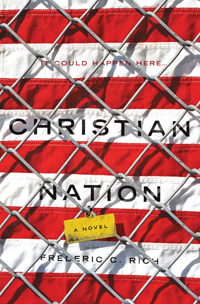 It's been just over a year since the American public observed -- many of us with morbid fascination and increasing alarm -- the Republican primary debates of the last election. Bachmann, Cain, Gingrich, Perry and Santorum all pandered to their Teavangelical supporters and brought their religious and culture war agenda to the center of the national stage. With those debates fading from memory, it's tempting to conclude that this flexing of muscle by the religious right was an aberration, swept aside by President Obama's second victory.
It's been just over a year since the American public observed -- many of us with morbid fascination and increasing alarm -- the Republican primary debates of the last election. Bachmann, Cain, Gingrich, Perry and Santorum all pandered to their Teavangelical supporters and brought their religious and culture war agenda to the center of the national stage. With those debates fading from memory, it's tempting to conclude that this flexing of muscle by the religious right was an aberration, swept aside by President Obama's second victory.But is that right? Have those passions faded? A YouGov Omnibus poll conducted this spring provides the answer: not at all. When asked whether they would favor or oppose establishing Christianity as the official state religion in their state, 34% of respondents were in favor (with 20% "strongly" in favor). You read that correctly: 34% in favor of establishing Christianity as the state religion, as in creating a theocracy. There's more: when asked whether they would favor an amendment to the U.S. Constitution making Christianity the official religion of the United States, 32% said yes. This was a national poll; imagine what the numbers must have been in Alabama, Kansas, and Oklahoma.
Also this spring, a group of representatives in the North Carolina House introduced actual legislation -- to my knowledge, the first of its kind since the founding of the republic -- to permit that State, or any of its subdivisions, to declare Christianity its official religion. The North Carolina bill had a great deal of regional support, but was withdrawn by House leadership after a barrage of national criticism.
Americans living in cities and states where the evangelical influence is minimal consistently underestimate both the ambitions and power of the religious right. But these numbers are no surprise to me. In the course of researching my novel, Christian Nation (in which McCain/Palin win in the 2008 presidential election and Sarah Palin becomes President when McCain dies in office), I learned that the religious right's base of support remains remarkably steady, virtually uninfluenced by the ups and down of national politics.
For over a decade, polls have consistently reported that 30-40% of our fellow citizens self-describe themselves as "born again" or "evangelical" and believe that Biblical prophecies accurately predict a detailed sequence of end-times events. Their leaders control both the vast Christian broadcasting movement and great swaths of the Republican Party at the precinct and state level. The Pew Forum on Religion and Public Life estimates that groups representing these citizens spend about $390 million each year to lobby the Federal government to impose their religion-based agenda on the rest of us. This demographic also has the highest voting record around -- 85% of their eligible voters turn out for elections. They are not disappearing and, despite the recent successes of the marriage equality movement, they continue to win victories in the culture war they have fought for 30 years.
At the heart of their political agenda is a deep antipathy to the idea of the separation of church and state. An energetic industry of pseudo-historians, legal "scholars" and home schooling educators relentlessly promotes the message that church-state separation is a myth concocted by liberal elites to keep America from realizing its true destiny as a "Godly Kingdom," a pious "shining city upon a hill." For many of our fellow citizens, the establishment (or, as they would say, restoration) of America as a "Christian Nation" is a condition to the second coming of Christ, the most important thing that can ever happen.
So I ask you: how does this compare with the things that motivate your politics? A fanatical fundamentalist minority is a dangerous thing in any culture, and even the strongest democracy can become vulnerable when buffeted by economic distress and external shocks, such as major terrorist attacks. Everyone -- mainstream Christians, and Republicans and Democrats both -- need to keep a wary eye on our home-grown fundamentalists. The consequences of failing to take them seriously could be fatal.
Original Article
Source: huffingtonpost.com
Author: Fred Rich
No comments:
Post a Comment